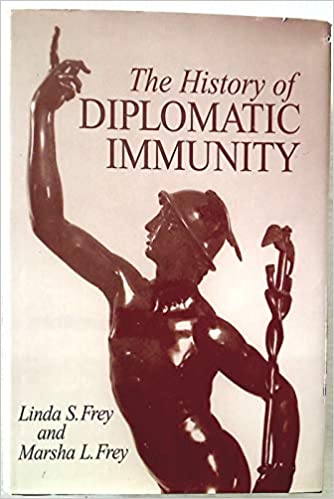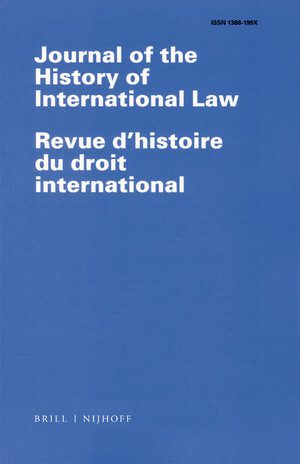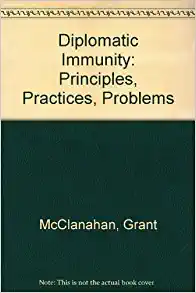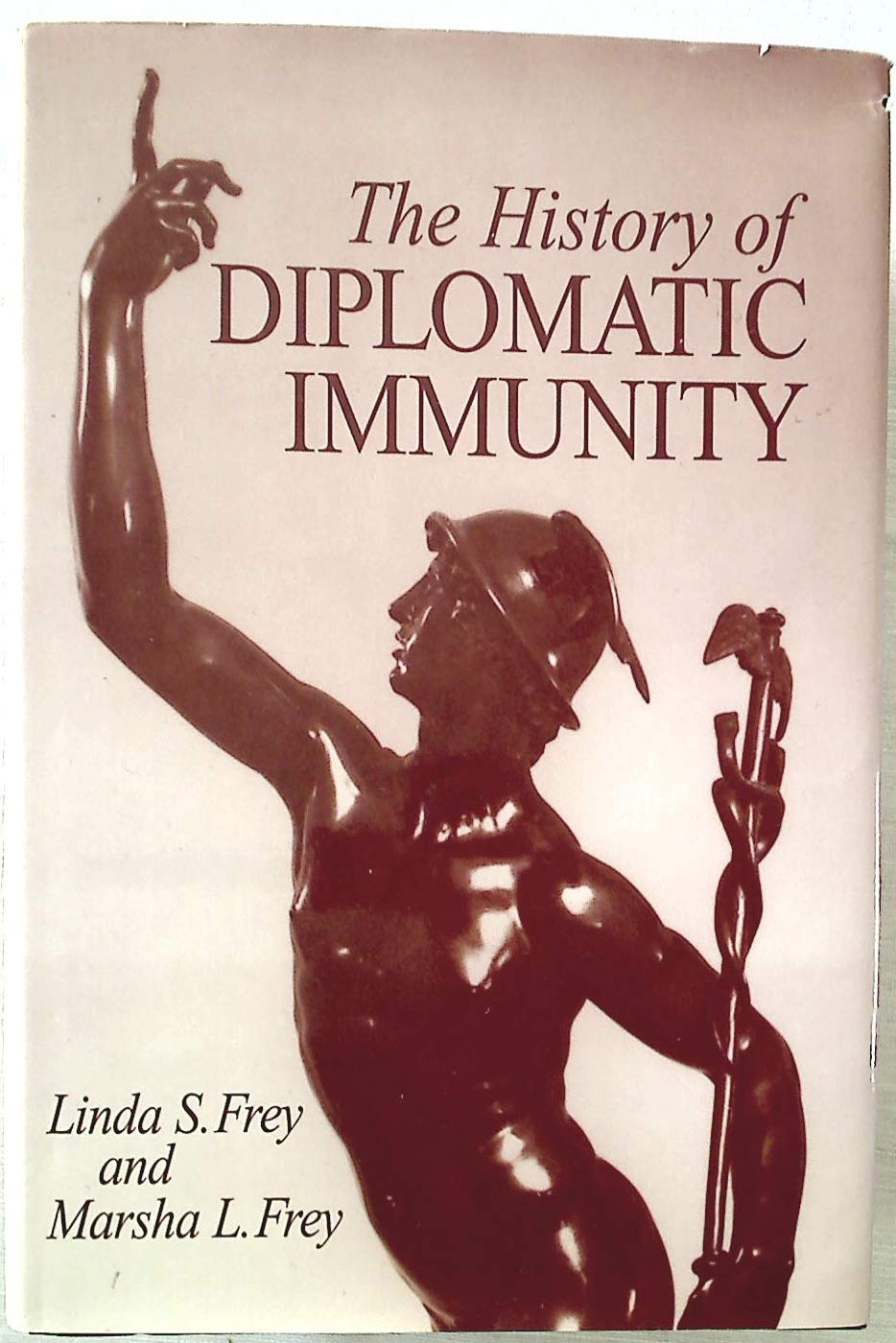Convention on the prevention and punishment of crimes against internationally protected persons, including diplomatic agents
States Parties to this Convention,
Having in mind the purposes and principles of the Charter of the United Nations concerning the maintenance of international peace and the promotion of friendly relations and cooperation among States,
Considering that crimes against diplomatic agents and other internationally protected persons jeopardizing the safety of these persons create a serious threat to the maintenance of normal international relations which are necessary for cooperation among States,
Believing that the commission of such crimes is a matter of grave concern to the international community,
Convinced that there is an urgent need to adopt appropriate and effective measures for the prevention and punishment of such crimes,
Have agreed as follows:
Article 1
For the purposes of this Convention:
1. “Internationally protected person” means:
(a) A Head of State, including any member of a collegial body performing the functions of a Head of State under the constitution of the State concerned, a Head of Government or a Minister for Foreign Affairs, whenever any such person is in a foreign State, as well as members of his family who accompany him;
(b) Any representative or official of a State or any official or other agent of an international organization of an intergovernmental character who, at the time when and in the place where a crime against him, his official premises, his private accommodation or his means of transport is committed, is entitled pursuant to international law to special protection from any attack on his person, freedom or dignity, as well as members of his family forming part of his household.
2. “Alleged offender” means a person as to whom there is sufficient evidence to determine prima facie that he has committed or participated in one or more of the crimes set forth in article 2.
Article 2
1. The intentional commission of:
(a) A murder, kidnapping or other attack upon the person or liberty of an internationally protected person;
b) A violent attack upon the official premises, the private accommodation or the means of transport of an internationally protected person likely to endanger his person or liberty;
(c) A threat to commit any such attack;
(d) An attempt to commit any such attack; and
(e) An act constituting participation as an accomplice in any such attack shall be made by each State Party a crime under its internal law.
2. Each State Party shall make these crimes punishable by appropriate penalties which take into account their grave nature.
3. Paragraphs 1 and 2 of this article in no way derogate from the obligations of States Parties under international law to take all appropriate measures to prevent other attacks on the person, freedom or dignity of an internationally protected person.
Article 3
1. Each State Party shall take such measures as may be necessary to establish its jurisdiction over the crimes set forth in article 2 in the following cases:
(a) When the crime is committed in the territory of that State or on board a ship or aircraft registered in that State;
(b) When the alleged offender is a national of that State;
(c) When the crime is committed against an internationally protected person as defined in article 1 who enjoys his status as such by virtue of functions which he exercises on behalf of that State.
2. Each State Party shall likewise take such measures as may be necessary to establish its jurisdiction over these crimes in cases where the alleged offender is present in its territory and it does not extradite him pursuant to article 8 to any of the States mentioned in paragraph 1 of this article.
3. This Convention does not exclude any criminal jurisdiction exercised in accordance with internal law.
Article 4
States Parties shall cooperate in the prevention of the crimes set forth in article 2, particularly by:
(a) taking all practicable measures to prevent preparations in their respective territories for the commission of those crimes within or outside their territories;
(b) exchanging information and coordinating the taking of administrative and other measures as appropriate to prevent the commission of those crimes.
Article 5
1. The State Party in which any of the crimes set forth in article 2 has been committed shall, if it has reason to believe that an alleged offender has fled from its territory, communicate to all other States concerned, directly or through the Secretary-General of the United Nations, all the pertinent facts regarding the crime committed and all available information regarding the identity of the alleged offender.
2. Whenever any of the crimes set forth in article 2 has been committed against an internationally protected person, any State Party which has information concerning the victim and the circumstances of the crime shall endeavour to transmit it, under the conditions provided for in its internal law, fully and promptly to the State Party on whose behalf he was exercising his functions.
Article 6
1. Upon being satisfied that the circumstances so warrant, the State Party in whose territory the alleged offender is present shall take the appropriate measures under its internal law so as to ensure his presence for the purpose of prosecution or extradition. Such measures shall be notified without delay directly or through the Secretary-General of the United Nations to:
(a) The State where the crime was committed;
(b) The State or States of which the alleged offender is a national or, if he is a stateless person, in whose territory he permanently resides;
(c) The State or States of which the internationally protected person concerned is a national or on whose behalf he was exercising his functions;
(d) All other States concerned; and
(e) The international organization of which the internationally protected person concerned is an official or an agent.
2. Any person regarding whom the measures referred to in paragraph 1 of this article are being taken shall be entitled:
(a) To communicate without delay with the nearest appropriate representative of the State of which he is a national or which is otherwise entitled to protect his rights or, if he is a stateless person, which he requests and which is willing to protect his rights; and
(b) To be visited by a representative of that State.
Article 7
The State Party in whose territory the alleged offender is present shall, if it does not extradite him, submit, without exception whatsoever and without undue delay, the case to its competent authorities for the purpose of prosecution, through proceedings in accordance with the laws of that State.
Article 8
1. To the extent that the crimes set forth in article 2 are not listed as extraditable offences in any extradition treaty existing between States Parties, they shall be deemed to be included as such therein. States Parties undertake to include those crimes as extraditable offences in every future extradition treaty to be concluded between them.
2. If a State Party which makes extradition conditional on the existence of a treaty receives a request for extradition from another State Party with which it has no extradition treaty, it may, if it decides to extradite, consider this Convention as the legal basis for extradition in respect of those crimes. Extradition shall be subject to the procedural provisions and the other conditions of the law of the requested State.
3. States Parties which do not make extradition conditional on the existence of a treaty shall recognize those crimes as extraditable offences between themselves subject to the procedural provisions and the other conditions of the law of the requested State.
4. Each of the crimes shall be treated, for the purpose of extradition between States Parties, as if it had been committed not only in the place in which it occurred but also in the territories of the States required to establish their jurisdiction in accordance with paragraph 1 of article 3.
Article 9
Any person regarding whom proceedings are being carried out in connection with any of the crimes set forth in article 2 shall be guaranteed fair treatment at all stages of the proceedings.
Article 10
1. States Parties shall afford one another the greatest measure of assistance in connection with criminal proceedings brought in respect of the crimes set forth in article 2, including the supply of all evidence at their disposal necessary for the proceedings.
2. The provisions of paragraph 1 of this article shall not affect obligations concerning mutual judicial assistance embodied in any other treaty.
Article 11
The State Party where an alleged offender is prosecuted shall communicate the final outcome of the proceedings to the Secretary-General of the United Nations, who shall transmit the information to the other States Parties.
Article 12
The provisions of this Convention shall not affect the application of the Treaties on Asylum, in force at the date of the adoption of this Convention, as between the States which are parties to those Treaties; but a State Party to this Convention may not invoke those Treaties with respect to another State Party to this Convention which is not a party to those Treaties.
Article 13
1. Any dispute between two or more States Parties concerning the interpretation or application of this Convention which is not settled by negotiation shall, at the request of one of them, be submitted to arbitration. If within six months from the date of the request for arbitration the parties are unable to agree on the organization of the arbitration, any one of those parties may refer the dispute to the International Court of Justice by request in conformity with the Statute of the Court.
2. Each State Party may at the time of signature or ratification of this Convention or accession thereto declare that it does not consider itself bound by paragraph 1 of this article. The other States Parties shall not be bound by paragraph 1 of this article with respect to any State Party which has made such a reservation.
3. Any State Party which has made a reservation in accordance with paragraph 2 of this article may at any time withdraw that reservation by notification to the Secretary-General of the United Nations.
Article 14
This Convention shall be open for signature by all States, until 31 December 1974, at United Nations Headquarters in New York.
Article 15
This Convention is subject to ratification. The instruments of ratification shall be deposited with the Secretary-General of the United Nations.
Article 16
This Convention shall remain open for accession by any State. The instruments of accession shall be deposited with the Secretary-General of the United Nations.
Article 17
1. This Convention shall enter into force on the thirtieth day following the date of deposit of the twenty second instrument of ratification or accession with the Secretary-General of the United Nations.
2. For each State ratifying or acceding to the Convention after the deposit of the twenty-second instrument of ratification or accession, the Convention shall enter into force on the thirtieth day after deposit by such State of its instrument of ratification or accession.
Article 18
1. Any State Party may denounce this Convention by written notification to the Secretary-General of the United Nations.
2. Denunciation shall take effect six months following the date on which notification is received by the Secretary-General of the United Nations.
Article 19
The Secretary-General of the United Nations shall inform all States, inter alia:
(a) Of signatures to this Convention, of the deposit of instruments of ratification or accession in accordance with articles 14, 15 and 16 and of notifications made under article 18;
(b) Of the date on which this Convention will enter into force in accordance with article 17. Article 20
The original of this Convention, of which the Chinese, English, French, Russian and Spanish texts are equally authentic, shall be deposited with the Secretary-General of the United Nations, who shall send certified copies thereof to all States.
IN WITNESS WHEREOF the undersigned, being duly authorized thereto by their respective Governments, have signed this Convention, opened for signature at New York on 14 December 1973.












